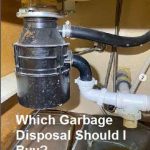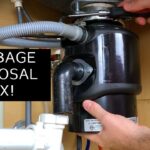To fix a garbage disposal leak, first, disconnect the power supply and locate the source of the leak. Then, tighten the connections or replace the faulty component.
Table of Contents
Signs Of A Garbage Disposal Leak
Dealing with a leaky garbage disposal can be frustrating and messy. However, the first step in fixing the problem is identifying the signs of a leak. By recognizing these signs early on, you can take prompt action to prevent further damage and avoid potential health hazards.
Unpleasant Odors
One of the most common signs of a garbage disposal leak is the presence of unpleasant odors. When a leak occurs, food debris can become trapped in the crevices and gaps, leading to the growth of bacteria and the release of foul smells. If you start noticing a persistent and unpleasant odor in your kitchen, accompanied by a leaky garbage disposal, it’s likely that you have a leak.
Puddles Of Water Under The Sink
Another telltale sign of a garbage disposal leak is the presence of puddles of water under the sink. If you notice water pooling or dripping underneath your sink cabinet, it’s a clear indication of a leak. This can happen due to a variety of reasons, such as loose connections, degraded gaskets, or worn-out seals. It’s important not to ignore this sign, as prolonged exposure to water can cause structural damage to your cabinets and promote the growth of mold and mildew.
Once you notice these signs of a garbage disposal leak, it’s crucial to take action to fix the problem and prevent further damage. In the next sections, we will discuss the steps you can take to address a leaky garbage disposal effectively.

Credit: gharpedia.com
How To Fix Garbage Disposal Leak Whirlpool Home
If your Whirlpool garbage disposal is leaking, the exact solution will depend on where the leak is coming from. Here are steps to diagnose and fix common leaks:
1. Safety First: Always turn off the power to the garbage disposal at the circuit breaker before working on it. Never put your hand down the drain into the disposal.
2. Identify the Source of the Leak: There are several common places where a garbage disposal can leak:
- The top where it attaches to the sink
- The side where the drain pipe connects
- The bottom of the unit
3. Top Leak (Sink Flange):
- a. The sink flange is the metal part that connects the garbage disposal to the sink. If it’s leaking, it might not be sealed properly.
- b. Loosen the mounting screws and push the disposal up slightly.
- c. Remove any old plumber’s putty from around the flange.
- d. Reapply a generous amount of new plumber’s putty around the flange.
- e. Reattach the disposal and tighten the mounting screws.
- f. Wipe away any excess putty.
4. Side Leak (Drain Pipe):
- a. If the leak is coming from the side where the drain pipe connects, you may need to replace the gasket or tighten the screws.
- b. Remove the drain pipe.
- c. Replace the gasket.
- d. Reattach the drain pipe and tighten the screws.
5. Bottom Leak:
- a. If the leak is coming from the bottom of the disposal, it may indicate a more serious problem, such as a cracked or corroded internal shell.
- b. Unfortunately, if the unit is leaking from the bottom, it’s usually time to replace the entire garbage disposal.
6. Test for Leaks: After making any fixes, run water through the disposal to check for leaks. Make sure to use a flashlight to get a good view.
7. Restore Power: Once you’re certain the leak is fixed, turn the power back on at the circuit breaker.
Remember: If you’re unsure about any of these steps or uncomfortable doing them yourself, always call a professional plumber or technician to handle the repair. It’s better to be safe than sorry.
Common Causes Of Garbage Disposal Leaks
Dealing with a leaking garbage disposal can be a frustrating experience. Not only does it create a mess in your kitchen, but it can also cause serious damage if left untreated. To fix a garbage disposal leak, it is important to identify the underlying cause. In this section, we will discuss the most common causes of garbage disposal leaks: worn out seals or gaskets, loose connections, and cracked or damaged pipes.
Worn Out Seals Or Gaskets
One of the primary causes of garbage disposal leaks is worn out seals or gaskets. Over time, the seals or gaskets that prevent water from leaking out can deteriorate due to constant use. When these seals become brittle or damaged, water can begin to seep out of the disposal unit.
To check for worn out seals or gaskets, it is important to inspect the bottom and sides of your garbage disposal. Look for any signs of water droplets, moisture, or mold. Additionally, you may notice a foul odor emanating from the unit. If you identify worn out seals or gaskets, replacing them is the most effective solution.
Loose Connections
Another common cause of garbage disposal leaks is loose connections. The connections between the various parts of the disposal unit can loosen over time due to vibrations and regular use. When these connections become loose, water can leak out from the joints.
To check for loose connections, it is important to turn off the power supply to the disposal unit and inspect the area where the unit connects to the sink and drain pipes. Tighten any loose connections using a pipe wrench or pliers. Additionally, ensure that the connections are properly aligned and sealed to prevent future leaks.
Cracked Or Damaged Pipes
Cracked or damaged pipes can also cause leaks in your garbage disposal. The constant flow of water, food particles, and debris can weaken the pipes over time, leading to cracks or damage. These cracks create an opportunity for water to escape and cause a leak.
To detect cracked or damaged pipes, visually inspect the areas around the disposal unit, including the pipes leading to and from it. Look for any signs of water dripping or pooled water. Additionally, if you notice a decrease in water flow or strange noises coming from the pipes, it could be an indication of damage. In such cases, it is essential to replace the affected pipes to prevent further leaks.
By understanding the common causes of garbage disposal leaks, you can take the necessary steps to fix the issue and prevent future leaks. Whether it’s replacing worn out seals, tightening loose connections, or repairing cracked pipes, addressing these problems promptly will help keep your kitchen clean and functional.
Diy Fixes For Garbage Disposal Leaks
Dealing with a leaky garbage disposal can be a real headache. Not only does it create a mess, but it can also lead to more significant problems if left unattended. However, there’s no need to panic! With a few simple do-it-yourself (DIY) fixes, you can have your garbage disposal leak-free in no time. In this article, we’ll walk you through three common DIY fixes for garbage disposal leaks: tightening loose connections, replacing worn out seals or gaskets, and patching or replacing cracked or damaged pipes.
Tightening Loose Connections
One of the most common reasons for a garbage disposal leak is loose connections. Over time, the various pipes and fittings that make up your disposal system can loosen, leading to leaks. To fix this issue:
- Start by turning off the power to your garbage disposal. This is crucial for safety.
- Inspect each connection point in the disposal system, including the drainpipe, dishwasher hose, and rubber gasket.
- If you find any loose connections, use a wrench to tighten them. Be careful not to overtighten, as this can cause damage.
- Once all the connections are tightened, turn on the water and power to the disposal, and check for any remaining leaks. If the problem persists, move on to the next DIY fix.
Replacing Worn Out Seals Or Gaskets
If you’ve tightened all the connections and the leak is still persistent, worn out seals or gaskets could be the culprit. These rubber components can deteriorate over time, causing leaks. Here’s how you can replace them:
- Turn off the power to your garbage disposal to ensure your safety.
- Take note of your garbage disposal’s make and model, and purchase the appropriate replacement seals or gaskets from a home improvement store.
- Using a screwdriver, carefully remove the old seals or gaskets from their respective positions in the disposal system.
- Insert the new seals or gaskets into their proper positions, making sure they fit snugly.
- Once the replacements are in place, turn on the power and water, and check for any remaining leaks. If the problem persists, move on to the third DIY fix.
Patching Or Replacing Cracked Or Damaged Pipes
Cracked or damaged pipes can also lead to leaks in your garbage disposal. To address this issue:
- Turn off the power supply to your garbage disposal.
- Inspect the entire length of the disposal system’s pipes for any signs of cracks or damage. Pay close attention to areas where leaks are prominent.
- If you discover any cracks or damage, use plumbing putty or epoxy to patch up minor cracks. For larger cracks or damage, it may be necessary to replace the affected section of the pipe.
- Once the repairs or replacement are complete, turn on the power and water, and check for any remaining leaks.
By following these simple DIY fixes, you can effectively address most garbage disposal leaks without the need for professional assistance. Remember, regular maintenance and prompt repairs can help prolong the lifespan of your garbage disposal and prevent further issues down the line.
When To Call A Professional
While tackling minor garbage disposal leaks can be a DIY endeavor, there are situations that call for the expertise of a professional plumber. When faced with safety risks, complex plumbing issues, or an aging disposal unit, it’s essential to know when to enlist the help of a trained specialist. By recognizing the signs and understanding the importance of professional intervention, you can ensure the integrity of your disposal system and safeguard your home from further damage. Let’s dive deeper into each scenario.
Safety Precautions When Dealing With Electrical Components
Electrical components always pose a safety risk, and your garbage disposal unit is no exception. When attempting to fix a disposal leak, it’s crucial to exercise extreme caution when handling any electricity-related elements. Remember to:
- Turn off the power: Start by unplugging the disposal from the electrical outlet underneath the sink or switching off the circuit breaker that controls the disposal.
- Double-check the power: Use a voltage tester to ensure that no electrical current is running through the disposal unit before proceeding with any repairs or adjustments.
- Use proper protective gear: When dealing with electrical components, always wear insulated gloves to protect yourself from potential shocks.
While these precautions may seem simple, it’s essential not to underestimate the risk involved in working with electrical components. If you lack experience or feel uncertain about your safety, it’s best to call a professional plumber who has the expertise to handle these situations safely.
Complex Plumbing Issues That Require Expertise
Though some minor leaks can be resolved with basic troubleshooting, there may be instances where more complex plumbing issues are at play. These issues could include:
- Cracked or corroded pipes: If your garbage disposal leak is caused by damaged pipes, it’s crucial to have them expertly assessed and repaired. Professionals can identify the extent of the damage and provide an appropriate, lasting solution.
- Blockages or clogs: Should your disposal leak be the result of severe blockages or clogs in the plumbing system, a plumber can employ specialized tools and techniques to clear the obstruction efficiently.
- Misaligned or incorrectly installed disposal unit: If your garbage disposal unit is not properly aligned or installed, it may cause leaks or other plumbing issues. Professionals have the knowledge and experience to rectify installation errors or recommend appropriate adjustments.
These plumbing complexities require precision and expertise to avoid exacerbating the problem further. By reaching out to a professional plumber, you can rest assured that the underlying cause of your garbage disposal leak will be identified and resolved effectively.
Age And Condition Of The Garbage Disposal Unit
If your garbage disposal unit is old or in poor condition, it may be more prone to leaks and other malfunctions. Signs that your disposal unit may be past its prime include:
- Frequent breakdowns: If you find yourself repeatedly repairing or troubleshooting your disposal unit, it may be an indication that it’s time to replace it. A professional can assess the overall condition and advise on whether a replacement is necessary.
- Excessive noise or vibrations: Unusual noises or vibrations during the operation of your disposal may signify internal damage or loose components. A professional plumber can inspect and diagnose the source of the issue to determine the best course of action.
- Visible signs of wear and tear: Cracks, rust, or leaks in the disposal unit itself are indications of significant damage. In such cases, a professional can determine the extent of the wear and recommend the most suitable repair or replacement options.
By considering the age and condition of your garbage disposal unit, you can make an informed decision about whether it’s time to consult a professional for repairs or a replacement. Their expertise will ensure that your disposal unit operates safely and efficiently, restoring peace of mind in your kitchen.
Preventive Measures To Avoid Garbage Disposal Leaks
When it comes to the maintenance of your garbage disposal, taking preventive measures can help you avoid costly leaks and repairs in the future. Regular maintenance and cleaning, avoiding putting certain materials down the disposal, and knowing the limitations of your unit are all important steps in preventing garbage disposal leaks. By following these guidelines, you can keep your garbage disposal functioning properly and extend its lifespan.
Regular Maintenance And Cleaning
Regular maintenance and cleaning of your garbage disposal are crucial for preventing leaks. One simple way to keep your disposal clean is by running cold water while using it. This helps to flush away any food particles or residue that may accumulate over time.
Additionally, you can use a mixture of dish soap and cold water to clean the grinding chamber and blades. This will help to remove any grease or debris that may be stuck and causing a potential leak.
Furthermore, it is recommended to clean your disposal at least once a month to ensure optimal performance and prevent leaks.
Avoiding Putting Certain Materials Down The Disposal
Avoiding putting certain materials down your garbage disposal can significantly reduce the risk of leaks. Hard items such as bones, fruit pits, and shells should never be thrown into the disposal as they can damage the blades and cause leaks.
Similarly, fibrous materials like celery stalks, corn husks, and onion skins should be disposed of in the regular trash instead of the disposal. These materials can get caught in the disposal’s grinding mechanism and lead to leaks. By being mindful of what you put down the disposal, you can prevent clogs and leaks.
Knowing The Limitations Of Your Garbage Disposal Unit
Understanding the limitations of your garbage disposal unit is essential for preventing leaks. Garbage disposals are designed to handle certain types and amounts of waste.
Overloading the disposal with large quantities of food waste can strain the motor and result in leaks. It is important to feed the disposal gradually and in small portions to avoid overwhelming its capabilities.
Additionally, avoid pouring grease or oil down the disposal as it can solidify and block the drain, causing leaks. By knowing the limitations of your unit and using it accordingly, you can prevent unnecessary leaks and damage.
Preventive measures such as regular maintenance and cleaning, avoiding certain materials, and understanding the limitations of your garbage disposal unit can go a long way in preventing leaks. By following these guidelines, you can ensure the longevity and optimal performance of your disposal, saving you from costly repairs and replacements.
Frequently Asked Questions Of How To Fix Garbage Disposal Leak
How Can I Fix A Garbage Disposal Leak?
To fix a garbage disposal leak, first, locate the source of the leak. It could be a loose connection, a worn-out seal, or a cracked pipe. Tighten loose connections, replace worn-out seals, or repair or replace cracked pipes. If you’re not confident in your DIY skills, it’s best to call a professional plumber for assistance.
What Are The Common Causes Of Garbage Disposal Leaks?
Common causes of garbage disposal leaks include loose connections, worn-out seals, cracked pipes, or excessive wear and tear over time. Other factors such as improper installation, overloading the disposal, or using it to dispose of inappropriate items can also contribute to leaks.
Regular maintenance can help prevent these issues.
Can I Fix A Garbage Disposal Leak Myself Or Should I Hire A Professional?
If you have basic plumbing skills and feel confident, you can fix a garbage disposal leak yourself. However, it’s important to know your limitations. If it’s a simple fix, like tightening connections or replacing a seal, you can DIY. But if the issue is complex or involves significant repair work, it’s advisable to hire a professional plumber to avoid causing further damage.
Should I Replace A Leaking Garbage Disposal Or Can It Be Repaired?
In most cases, a leaking garbage disposal can be repaired rather than replaced. It often depends on the severity of the leak and the condition of the unit. If the leak is minor and the disposal is still functioning well, repairs such as tightening connections or replacing seals can often solve the issue.
However, if the unit is old, damaged, or experiencing frequent leaks, it may be more cost-effective to replace it.
Conclusion
Fixing a garbage disposal leak is an essential skill for homeowners to possess. By following the steps outlined in this blog post, you can successfully troubleshoot and resolve common leakage issues. Remember to regularly inspect and maintain your garbage disposal unit to prevent future leaks.
With proper care and attention, you can keep your kitchen running smoothly and efficiently. Your plumbing will thank you!

Williams Kane is a blogger and writer. He’s passionate about writing and connecting with the community, especially when it comes to sharing his ideas through writing.
I am a versatile author with a passion for exploring a wide range of topics on our multi-niche website. With a background in research and a love for writing, I bring a unique blend of expertise to our platform.
My journey began in the world of science, where I earned a degree in biology and developed a deep fascination for the natural world. This background enables me to delve into topics related to ecology, environmental conservation, and the wonders of the animal kingdom.
However, my curiosity knows no bounds, and I have ventured into various other niches as well. From technology trends and digital innovations to health and wellness tips, I strive to provide well-researched and engaging content that informs and entertains our diverse audience.
Furthermore, my dedication to staying current with the latest developments in each niche ensures that our readers receive up-to-date and reliable information. Whether it’s deciphering complex scientific concepts or simplifying tech jargon, I take pride in making complex subjects accessible to all.
Join me on our multi-niche journey, where we explore the depths of knowledge and share insights on a multitude of topics to inspire, educate, and entertain.








